 Petzlover
Petzlover Domestic Shorthaired Cat is originated from United States but Tonkinese is originated from Canada. Both Domestic Shorthaired Cat and Tonkinese are of same weight. Both Domestic Shorthaired Cat and Tonkinese has almost same life span. Both Domestic Shorthaired Cat and Tonkinese has same litter size. Domestic Shorthaired Cat requires Low Maintenance. But Tonkinese requires Moderate Maintenance
Domestic Shorthaired Cat is originated from United States but Tonkinese is originated from Canada. Both Domestic Shorthaired Cat and Tonkinese are of same weight. Both Domestic Shorthaired Cat and Tonkinese has almost same life span. Both Domestic Shorthaired Cat and Tonkinese has same litter size. Domestic Shorthaired Cat requires Low Maintenance. But Tonkinese requires Moderate Maintenance
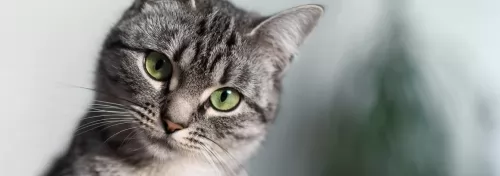 The Domestic short-haired cat has also got mixed ancestry and can have lots of different looks. In the UK they are often referred to as Moggie.
The Domestic short-haired cat has also got mixed ancestry and can have lots of different looks. In the UK they are often referred to as Moggie.
It is one of the most common cats in the United States. The roots of this cat go back to the pioneer settlement in North America where they were thought of as working cats. Nobody seems clear on where they originated from.
Hardy and unaffected, they quickly became a sought after cat that stood up well to all kinds of conditions. Even though this cat is a non-pedigreed cat, it is accepted by the Cat Fanciers' Association (CFA) in the Household Pets category.
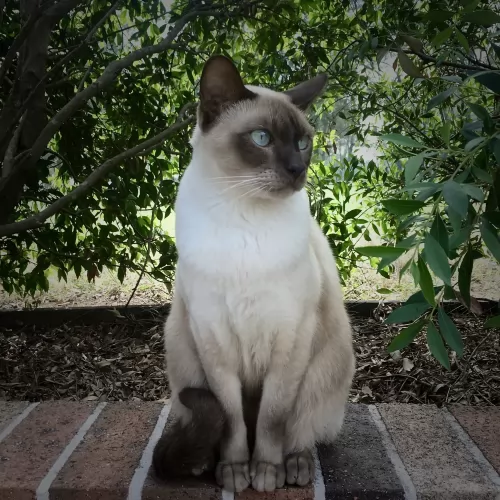 It was about in 1960 that a breeding program was established for these cats. The Tonkinese is a cat that hails from Canada and it was a certain Jane Batlett who was responsible for breeding this cat.
It was about in 1960 that a breeding program was established for these cats. The Tonkinese is a cat that hails from Canada and it was a certain Jane Batlett who was responsible for breeding this cat.
Also, Margaret Conroy, another breeder, set up her breeding program between a Burmese female with a Siamese. Both Conroy and Bartlett worked together on the breed and the Tonkinese came about. The Cat Fanciers Association recognized this cat breed in 1984.
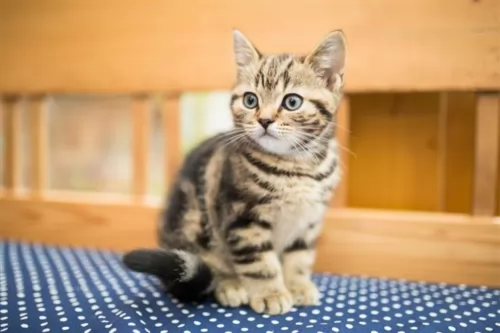 The Domestic short-haired cats can be so many things – different coat colors and different patterns as well as being different shapes and sizes.
The Domestic short-haired cats can be so many things – different coat colors and different patterns as well as being different shapes and sizes.
They can all have different shaped eyes and colors and their ears and tails can differ from cat to cat. The reason for this is that these cats don’t belong to a specific breed.
It has a mixed ancestral history. The Domestic Shorthaired varies in colors and size and their coats can be any color, solid or patterned. The length of the coat is short and is silky and shiny.
It’s a low shedding cat and grooming will be easy. Every cat has its own physical characteristics, and some can have a slight build while others are heavier built and more muscular.
You could find their eyes can be different colors too – blue, green, copper or brown.
Just like the Domestic Shorthair has lots of different looks, the temperament too varies. There is no set standard for these cats and when you choose a kitten, you can’t really be sure how they will turn out.
Your cat may be quiet, very vocal, active, placid, loyal loving, independent, playful or lazy – who knows with these wonderful cats?
Certainly, most of them are friendly, loving and loyal. They make wonderful pets for new cat owners, singles, couples, families and seniors.
People love them as they aren’t high maintenance pets – they are undemanding.
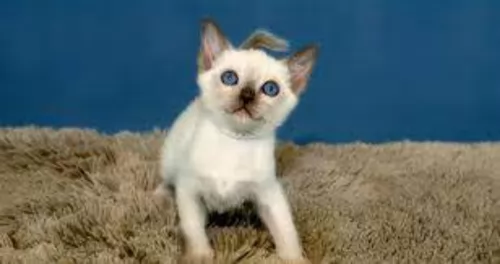 As a medium-sized cat, with a firm, muscular body, your Tonkinese will weigh between 2.5 – 6kg.The head is slightly rounded with fairly broad ears that are set wide apart.
As a medium-sized cat, with a firm, muscular body, your Tonkinese will weigh between 2.5 – 6kg.The head is slightly rounded with fairly broad ears that are set wide apart.
The eyes are bigger than the classic Oriental shape and can range from green to light blue in color.
The coat of the Tonkinese is short and close-lying and is soft and silky to touch. The mask, the ears, legs and tail are all darker than the body.
The Tonkinese cat breed is recognized by the Cat Fanciers' Association in 4 base colors - medium brown, champagne, blue and and platinum.
The Tonkinese cat, with one of its parents being the Siamese cat, just loves giving and receiving attention.
Active and social, he is an excellent choice for families with children and even other pets. They love just seeking out their human companions and lying down where they are.
They’re intelligent felines these, and you can even teach them some simple commands. Because of them being so very social, they don’t like to be left on their own – certainly not for the whole day while you go off to work.
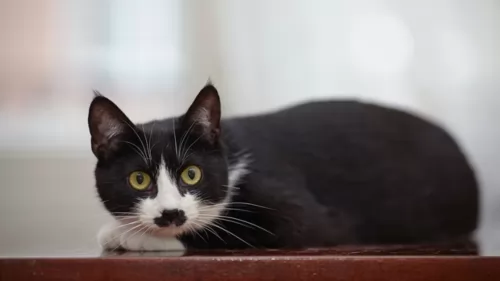 As we’ve already suggested, the Domestic Shorthaired has an easy-going personality, not demanding much from you except nutritious food and lots of love and attention.
As we’ve already suggested, the Domestic Shorthaired has an easy-going personality, not demanding much from you except nutritious food and lots of love and attention.
It’s important to provide your cat with a lifestyle that keeps him happy and content.
Rather than buy your pets lots of expensive cat accessories, your cat will be happier to do with less but to have more attention from you. This cat is willing to give you so much love and companionship ad he asks the same from you.
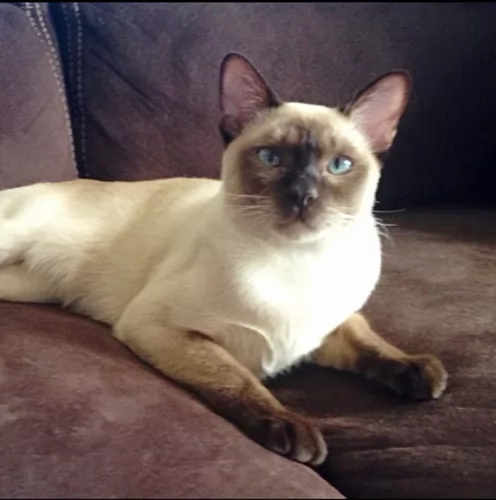 Tonkinese cats can be active and highly entertaining with their antics. When you laugh at them, they are encouraged to perform more.
Tonkinese cats can be active and highly entertaining with their antics. When you laugh at them, they are encouraged to perform more.
They are affectionate and intelligent cats and you will need to have toys for him. When he isn't playing, he likes nothing more than to be petted and pampered by his human family.
Your Tonkinese will get on well with children and other pets, and he generally makes a splendid pet for those who care well for him.
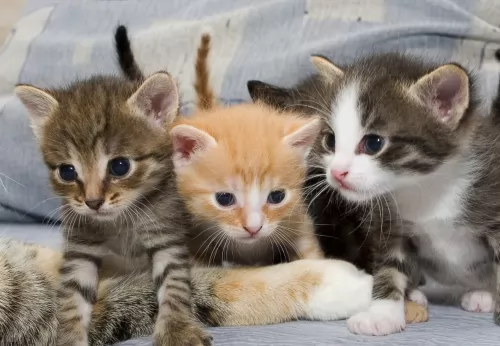 Because of their mixed breed, these Domestic Shorthaired cats don’t sicken easily and they are healthy cats and robust – less vulnerable to the genetic problems that plague purebred cats.
Because of their mixed breed, these Domestic Shorthaired cats don’t sicken easily and they are healthy cats and robust – less vulnerable to the genetic problems that plague purebred cats.
Nonetheless, he can succumb to illness and then you need to get him to the vet immediately. There are come cat illnesses that can kill your cat in just a few hours. Look at bloat as an example – this is when your cat’s stomach becomes swollen and your pet is weak and vomiting. It’s a life-threatening condition that can kill your cat in half an hour,
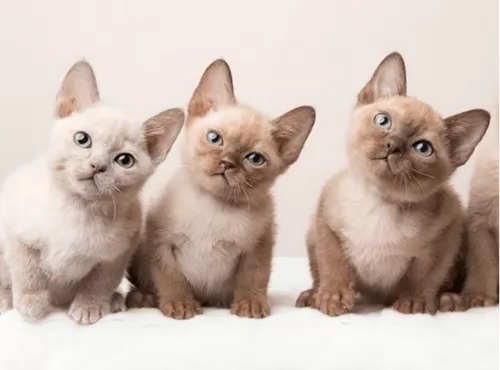 Tonkinese are generally healthy cats but they can be prone to eye problems such as gingvitis.
Tonkinese are generally healthy cats but they can be prone to eye problems such as gingvitis.
Because they are part of the Siamese family, they can succumb to some of the diseases that the Siamese battles with. These are asthma/bronchial disease, heart defects, lymphoma, and crossed eyes.
Lymphoma is linked with feline leukemia, a viral infection, and thankfully, more cats are being vaccinated for feline leukemia, so fortunately it is becoming less common.
Intestinal lymphoma affects the gastrointestinal tract and is the most common type of lymphoma in cats, being more common in older cats. Affected cats can suffer with weight loss, vomiting, and diarrhea. Get your cat to the vet as diagnosing this lymphoma will require the vet finding cancerous cells on microscopic examination.
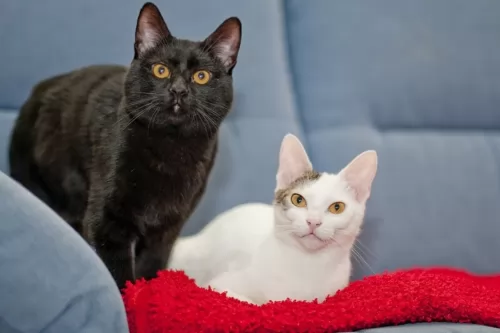 Just like you prepare for a human baby’s arrival, prepare for your Domestic Shorthaired’ arrival.
Just like you prepare for a human baby’s arrival, prepare for your Domestic Shorthaired’ arrival.
Have food and water bowls, a nice, dry, warm bed, toys to stimulate mind and body, litter box, scratching post, climbing tree and collar.
Have your cat neutered or spayed. This is to avoid unwanted kittens. You’ll often see these cats in animal shelters and you don’t want to add to the burden of these shelters. By neutering and spaying your cat, they behave in a better way. They are far less likely to want to roam away from home as well. A cat that have been neutered or spayed also enjoys a host of health benefits, and this common surgical operation is highly recommended.
Food for your cat is very important for good health. Do research and you’ll discover how imperative good gut-health is. A poor diet and the wrong diet can cause your cat to battle with a lot of poor health issues and digestive problems.
You’ll end up spending a fortune on your cat’s vet bills. A cat is a carnivore and it is most important to feed your cat meat. Check out the labels on the cat’s commercially manufactured food and choose the ones that make meat a top ingredient.
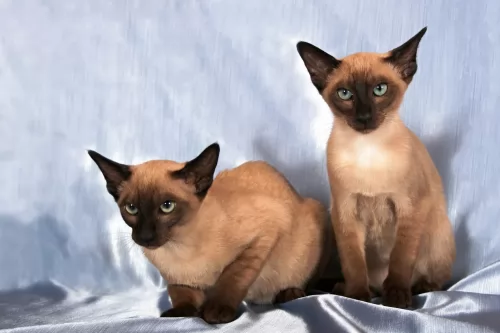 The Tonkinese has a short coat so a brush once a week will be sufficient for this cat as it just helps to brush away dust and loose hairs.
The Tonkinese has a short coat so a brush once a week will be sufficient for this cat as it just helps to brush away dust and loose hairs.
He will need a litter box and this will need to be kept spotlessly clean. Use a small rake, available from your vet or local pet shop, to rake up the cat’s feces.
When you first bring your Tonkinese cat home, you will at least need some of the basics to ensure his wellbeing. These are -
sleeping equipment – baskets or cushions in a nice warm, dry place for your cat.
A cat tree for climbing and a scratching post. Cats are natural scratchers so you can’t get angry with your cat for scratching. Instead, invest in a scratching post so that he doesn’t use your furniture to scratch on.
Food is such an important part of caring for a cat. The best type of cat food can ensure your cat has a strong immune system that allows him to not succumb to every cat sickness there is.
Cats are carnivores so ensure he has food high in meat. Sometimes it can be costly, but try to provide your cat with the best, most high-quality cat foods there are to ensure his good health and happiness.
A cat needs a constant supply of fresh, cool water night and day. The water should be changed regularly.